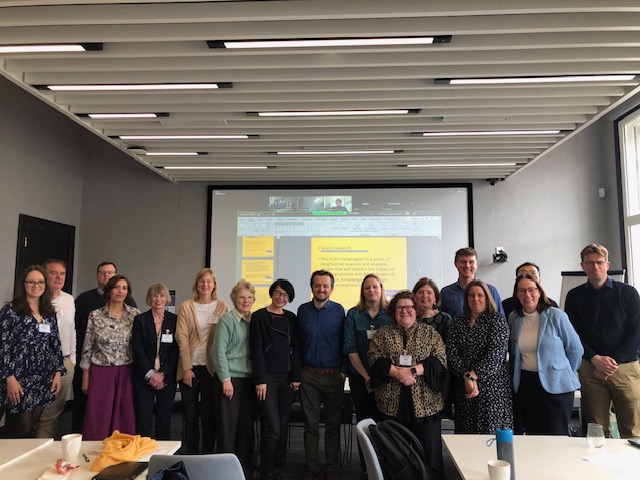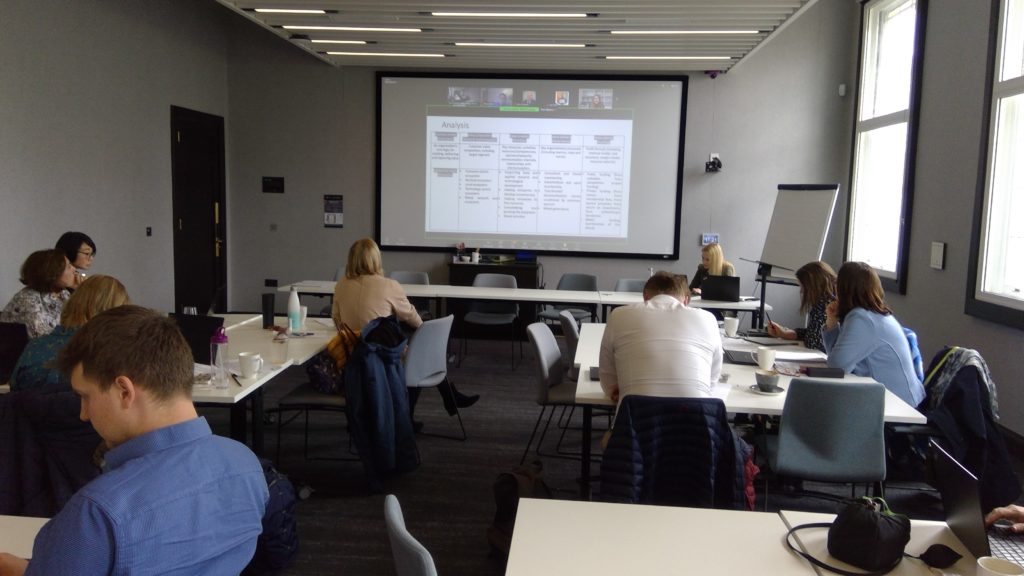24 April 2024, The Exchange, Birmingham – City-Region Economic Development Institute (City-REDI), University of Birmingham (UoB) and Centre for Innovation Management Research (CIMR), Birkbeck, University of London with kind support from the Innovation and Research Caucus (IRC).
This was the first in what we hope will be a series of workshops which brings together colleagues from City-REDI, UoB, and CIMR. What worked so well was having as the theme ‘Skills for Innovation’. It provided the opportunity for many different perspectives from academia, policy and businesses on the fundamentally important role of skills in innovation-led economic development. A constant theme throughout the day was the need for an evidence base.

Highlighting the importance of training for Innovation – Morning Session

The morning session on Skills for Innovation explored the scope for future collaboration and policy engagement. Why ‘skills for innovation’? Who are the stakeholders, and what interventions would be needed? What are the ‘skills gaps’ for innovation?
A unifying theme in this session was that of the importance of training for innovation.
Abigail Taylor, in her presentation on the UK’s skills challenges, kicked this off by highlighting the comparatively higher propensity to plug skills shortages through recruiting as opposed to training in the UK than in several international counterparts. Marion Frenz, looking at microbusinesses, stressed the importance of different types of training for innovation in microbusinesses in the context of prior business planning to commit resources to training and external business advice. Kostas Kollydas spoke about skills in relation to the Research and Innovation Workforce. Training came up later when we looked at the role of the ecosystem actors, including in Federica Rossi’s presentation on digital innovation intermediaries, and Chloe Billing’s insights from the Space Industry.
There were also commonalities on skills issues between the papers on business start-up accelerators by Juliane Schwarz, and those on university graduates and regional skills by Anne Green and Helen Lawton Smith on the theme of ecosystem actors and the impact that such actors and actions can have on participating firms. Juliane’s focus was on an incubator programme in London as a local regional actor, Helen drew on research on the link between university graduates and regional prosperity in the case of the Southeast of Ireland. Anne and colleagues also highlighted how graduates can have a significant impact on an area’s growth and linked this to the UK’s efforts on the levelling up agenda’s aims to reduce disparities in economic growth, productivity and opportunity.
Matt Lyons and Huanjia Ma provided detailed analysis onregional distribution of digital skills shortages and the economic impacts of these shortages, respectively. Matt reported on the development and application of the SEIM-UK – labour market module with its focus on mismatches on regional labour supply – unemployment and regional labour demand – vacancies. Huanjia highlighted the economy-wide impact of skilled labour bottlenecks which affect the speed of matching between the demand and supply of labour.
Bridging the Policy-Evidence-Research Gap – Afternoon Policy-Research Panel Discussion

The afternoon panel discussion addressed the question of: how do we fill the gaps between policy and research evidence?
This brought together academics and practitioners – Jen Nelles from Oxford Brookes/IRC, two colleagues from the West Midlands Combined Authority (WMCA) Steven Heales and David Gaughan, Greg Wade (Universities UK) Chris Millward (UoB). Jen Nelles’ conceptual framework – Innovation Skills Framework – was designed to answer the question: what skills are necessary for innovation? Themes of creating environments for innovation (public policy, businesses, skills training in different kinds of organisations, alignment of policies and practice), where innovation is taking place (in SMEs, in larger businesses) were explored in the session.
Anne Green concluded with an excellent set of 10 takeways:
- Defining what we are talking about – what does ‘skills’ mean? what does ‘innovation’ mean?
- Measurement – what are we measuring and how well as we measuring it? For example, we distinguish between ‘on the job’ and ‘off the job’, formal learning and informal learning, etc. How well do the measures we have available inform/ reflect current practice?
- Skills is a key issue in innovation – but we need to consider what skills we need for innovation?
- Heterogeneity of businesses: we need to consider how businesses of different sizes innovate. We might also expect differences by sector.
- Mix of skills – the most powerful single theme arising from the workshop was the need for different skills and knowledge to ‘come together’ for innovation – e.g. legal skills and AI skills (N.B. the ‘and’ is crucial here: it is not ‘legal skills or AI skills’). ‘Life skills’ are crucially important too. A mix of skills in adjacent roles help to foster collaboration.
- Digital skills are crucial for innovation. Digital competence is important if people are to be brought back into the labour market while advanced level digital skills are needed regionally, nationally and internationally.
- Role of institutions needs to be appreciated – responsibility is for skills for innovation is divided across government departments and between government and other actors.
- Universities can play a key role as connectors – across people, research, skills, innovation and place. This ‘connecting’ role underpinned the establishment of the University of Birmingham, with Joseph Chamberlain as the first Chancellor. In the 21st century universities can still play an important role in facilitating alignment of people, research, skills and innovation in place.
- Value in learning from elsewhere – there is scope to learn from experience in other countries e.g. education, graduates and innovation in southeast Ireland; the tertiary sector in Wales.
- AI for growth – looking ahead, AI is likely to play an ever greater role in innovation. So, a key question is will this accentuate spatial disparities of reduce them?
Finally, Anne noted that a topic we had not touched on was immigration. What is the role of migration and interchange across borders in enhancing skills for innovation?
We thank Fumi Kitagawa for her wonderful organisation on this, to the presenters and to our colleagues who joined us online.
Blog submitted by Fumi Kitagawa, Anne Green, Helen Lawton Smith and Marion Frenz

